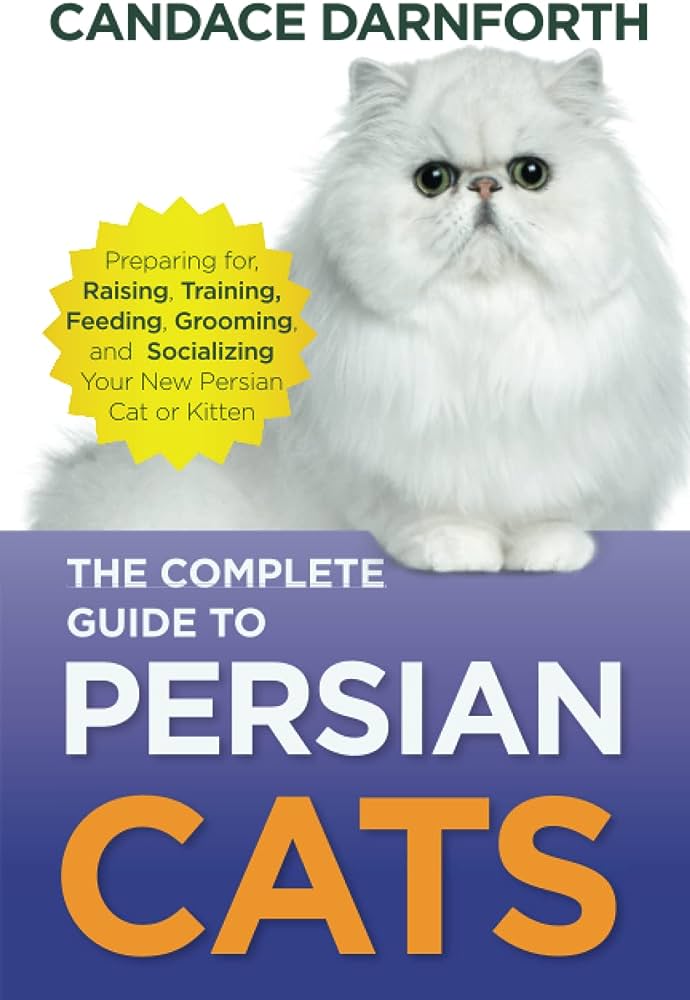care is an important topic for any pet owner. In this article, you’ll learn all about how to care for a Persian cat, whether you’re a beginner or have some experience. We’ll cover everything from grooming and nutrition to exercise and health. By the end of this article, you’ll have all the information you need to keep your Persian cat happy and healthy. So let’s get started!
Persian Cat Care: A Complete Guide for Beginners
Owning a Persian cat can be a truly rewarding experience. Known for their stunning looks and gentle demeanor, Persian cats are one of the most popular cat breeds in the world. However, their luxurious coats and unique needs require extra care and attention. In this complete guide, we will cover everything you need to know about Persian cat care, from grooming and feeding to healthcare and socialization. So, whether you’re a new Persian cat owner or considering bringing one into your home, let’s dive in and discover how to ensure the well-being of your feline friend.

Grooming
One of the most distinctive features of Persian cats is their long, lavish coat. Keeping their coats in top condition requires regular grooming. Daily brushing is a must to prevent matting and tangling, as their hair is prone to knots. Use a high-quality brush specifically designed for long-haired cats to gently remove any loose hair and keep their coat looking its best. Pay special attention to the areas behind their ears, under their legs, and around the tail, as these are common areas for matting to occur.
In addition to brushing, regular bathing is also essential. Use a mild cat shampoo and make sure to rinse them thoroughly. After bathing, it’s important to dry their fur completely to avoid skin issues. Be prepared for the occasional tear staining around their eyes, as Persian cats have large and round eyes. Regularly cleaning the area with a damp cloth will help keep their face clean and free from stains.
Feeding
A balanced diet is crucial for the overall health and well-being of Persian cats. Provide them with a high-quality cat food specifically formulated for their needs. Opt for a diet that includes real meat as the main ingredient, as cats are obligate carnivores and require animal protein. Avoid foods that contain fillers, by-products, or artificial ingredients.
It’s important to monitor your Persian cat’s weight and adjust their feeding portions accordingly. Obesity can lead to numerous health issues, so it’s best to maintain a healthy weight range for your cat. Freshwater should always be available, and be sure to clean their water bowl regularly.
Healthcare
To ensure your Persian cat remains in good health, regular veterinary check-ups are essential. Schedule annual visits to the vet for vaccinations, overall health examinations, and to address any concerns or questions you may have. Additionally, stay up to date with flea and tick prevention to protect your cat from external parasites.
Since Persian cats have short noses and flat faces, they are prone to certain respiratory problems. Their facial structure may lead to issues such as breathing difficulties, excessive tearing, and eye infections. Regular eye cleaning and proper grooming can help minimize the impact of these issues. It is also important to keep up with dental care by providing them with dental treats or brushing their teeth regularly to prevent dental disease.
Exercise and Play
While Persian cats may not be as energetic as some other breeds, they still need regular exercise to maintain a healthy weight and prevent obesity. Engage them in daily play sessions using toys that stimulate their natural instincts, such as chasing and pouncing. Incorporate interactive toys, puzzle feeders, or even a cat tree to keep them mentally and physically stimulated.

Socialization
Persian cats are known for their gentle nature and loving personality. To foster healthy socialization, it’s important to introduce them to different environments, people, and animals from a young age. This will help them adapt well to changes and become more confident and sociable.
Provide them with a safe and secure environment where they can explore and interact with their surroundings. Offer plenty of hiding spots and vertical spaces for them to feel comfortable and secure. Regular positive reinforcement training and rewards will also help them develop good behavior and respond positively to commands.
Behavior
Persian cats are generally calm and well-behaved, but like any other cat, they may exhibit certain behaviors that need attention and understanding. Some common behavioral issues in Persian cats include excessive scratching, furniture damage, and urinating outside the litter box.
To address scratching, provide them with appropriate scratching posts and redirect their attention away from furniture. Regular nail trims will also help keep their claws in good condition. In cases of inappropriate urination, ensure they have easy access to clean litter boxes and consider consulting with a veterinarian to rule out any underlying medical issues.

Training
While cats are known for their independent nature, Persian cats can be trained to follow commands and respond to their owners. Positive reinforcement is key to successful training. Use treats, praise, and playtime as rewards for desired behaviors. Start with basic commands such as “sit,” “stay,” or “come,” and gradually move on to more complex tricks and behaviors.
Creating a Safe Environment
Ensuring your Persian cat’s safety is of utmost importance. Remove any hazardous substances or plants from their reach, and secure windows and balconies to prevent accidents. Keep electrical cords hidden or protected to avoid chewing or entanglement. Create a designated space with a cozy bed, scratching post, and toys to give them a sense of security and comfort.

Choosing the Right Persian Cat
When looking to bring a Persian cat into your home, it’s important to do your research and find a reputable breeder or adoption center. Consider factors such as the cat’s lineage, health history, and personality traits. Spend time with the cat to ensure a good fit for both you and the cat. Remember, owning a Persian cat is a long-term commitment, so choose wisely.
Living with Other Pets
If you have other pets in your home, proper introductions and gradual acclimation are key to ensuring harmony. Persian cats are generally adaptable and can coexist peacefully with other cats or dogs. Give them plenty of time to get to know each other and supervise their initial interactions to ensure a smooth transition. With patience and positive reinforcement, they can become great companions to your other pets.

Breeding
Breeding Persian cats requires thorough knowledge, experience, and dedication. If you are considering breeding, consult with a reputable breeder or a veterinarian who specializes in feline reproduction. Breeding should only be done responsibly and with the goal of improving the breed while ensuring the health and well-being of the cats involved.
Traveling with Your Persian Cat
If you need to travel with your Persian cat, it’s important to plan ahead and ensure their comfort and safety. Use a secure and well-ventilated carrier, and introduce them to it gradually before the trip. Make sure they have access to fresh water, food, and a familiar blanket or toy for comfort. Consult with your veterinarian for any additional requirements or advice specific to your cat’s needs.
Common Health Issues
While Persian cats are generally healthy, they are predisposed to certain breed-specific health issues. These can include respiratory problems, dental disease, polycystic kidney disease (PKD), and hypertrophic cardiomyopathy (HCM). Regular veterinary check-ups, proper grooming, and a balanced diet are crucial in minimizing the impact of these health issues. Be proactive in understanding and addressing any potential health concerns with your veterinarian.
Conclusion
Congratulations! You have now gained a comprehensive understanding of Persian cat care. By following the guidelines outlined in this complete guide, you can ensure the happiness, health, and well-being of your Persian cat. Remember, each cat is unique, so observing and understanding their individual needs is essential. Enjoy the journey of being a Persian cat owner and cherish the special bond you’ll develop with your feline companion.
Frequently Asked Questions
-
How often should I groom my Persian cat? Grooming your Persian cat should be a daily routine to prevent matting and keep their coat in top condition. Use a high-quality brush designed for long-haired cats and pay special attention to areas prone to matting.
-
What type of food is best for Persian cats? Choose a high-quality cat food that includes real meat as the main ingredient. Avoid fillers, by-products, and artificial ingredients. Consult with your veterinarian to determine the best diet for your Persian cat’s specific needs.
-
How often should I take my Persian cat to the vet? Regular veterinary check-ups are crucial for the health of your Persian cat. Schedule annual visits for vaccinations, overall health examinations, and to address any concerns or questions you may have.
-
Can I train my Persian cat to follow commands? Yes, Persian cats can be trained using positive reinforcement. Start with basic commands and gradually move on to more complex tricks and behaviors. Patience, consistency, and rewards are key to successful training.
-
What should I do if my Persian cat exhibits behavioral issues? If your Persian cat exhibits behavioral issues such as scratching furniture or urinating outside the litter box, address the underlying cause and provide appropriate alternatives. Consult with a veterinarian if the behavior persists.
-
How can I keep my Persian cat safe in my home? Create a safe environment for your Persian cat by removing any hazards, securing windows and balconies, and keeping electrical cords hidden. Provide them with a designated space with a cozy bed, scratching post, and toys.
-
How do I choose the right Persian cat for my home? When choosing a Persian cat, research reputable breeders or adoption centers and consider factors such as lineage, health history, and compatibility with your lifestyle. Spend time with the cat to ensure a good fit.
-
Can Persian cats get along with other pets? Persian cats can coexist peacefully with other cats or dogs with proper introductions and gradual acclimation. Give them time to get to know each other and supervise their interactions.
-
What should I consider if I want to breed Persian cats? Breeding Persian cats requires knowledge, experience, and dedication. Consult with a reputable breeder or veterinarian specializing in feline reproduction to ensure responsible breeding practices.
-
How can I travel with my Persian cat? Plan ahead and ensure your Persian cat’s comfort and safety when traveling. Use a secure carrier, introduce them to it gradually, and provide necessities like water, food, and familiar items for comfort. Consult with your veterinarian for specific advice.
